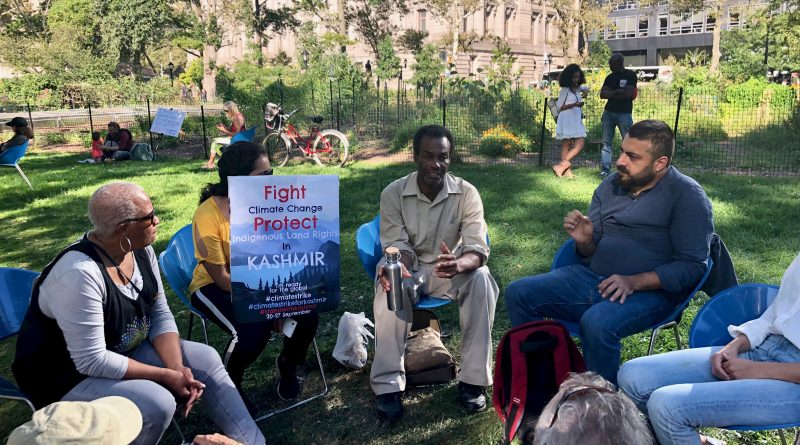OPINION: WHAT’S RACE GOT TO DO WITH IT?

Impromptu group discussing climate change and race at the Global Climate Strike in NYC, 9/20/19. Photo: Russ Vernon-Jones.

Last May I went back to a reunion at the college I attended many years ago. Because it’s a school with a long history of student social justice activism, I had proposed that the reunion weekend include a discussion or brief workshop on connections between climate change and racism. The reunion committee asked me if I would lead it. I replied that I would only lead it if I could co-lead with a person of color, and asked for their help finding someone. They reconnected me with Tossie, an African American man in our class. He and I had run on the college track team together, but hadn’t been in touch since we graduated decades ago.
Tossie was an excellent partner for this. We had fun planning the workshop over the phone. His stories about how racism had affected his life were painful to hear, but shared with grace, warmth, and insight. We agreed that he would get the attendees thinking and talking about race and racism, and I would focus on the connections to climate change.
The day before we were scheduled to present, another friend that I hadn’t seen since graduation said to me, “I know both racism and climate change are key issues and I care about both of them, but I’ve never thought they were connected. What’s the connection?” What follows is a version of my reply. (See also my previous posts on “What Are We Trying For? System Change?” and “How Are Racism and Climate Change Connected?”)
The economic system that prevails in the United States and globally has caused, and continues to cause, the climate crisis. That system depends on racism for its very existence. Therefore we must address racism, if we want to stop climate change.
How Does Racism Keep the Current Inequitable System in Place?
Racism has always been about maintaining and building the wealth of the white upper class through the exploitation of people of color, and about getting lower-income white people to accept the upper class’s exploitation of all workers. If we look back to colonial Virginia, the wealthy planters and enslavers were very worried that low-income whites and low-income blacks would get together and demand a “leveling” of wealth. They devised ways to get white working people to see their skin color commonality with the white owners as more important than the low economic status they shared with poor and enslaved Africans. They gave small economic advantages to white people who completed their indentured servitude (a rifle, a bit of land) and promoted an ideology of white people being better (more human) than black people and of black people being different, dangerous and lacking intelligence.
This created a split between low-income white people, and enslaved and low income people of African heritage. This split enabled the dominance of the white owners to continue. This split continues today between white people and people of color and allows the dominance and the obscenely unequal wealth of upper class white people to continue.
Five Ways Racism Maintains the System and Works Against Our Efforts to Stop Climate Change
This column focuses on how racism contributes to the climate problem. Even if racism didn’t play this role we would need to be dedicated to dismantling it because of the horrific toll it takes on people of color and also the way it dehumanizes and disconnects white people.
- Not caring is central to clearing the way for the wealthy and their corporations to harm people and planet in their pursuit of profits. Racism pushes white people to see people of different skin colors as “other” – as less important, as inferior, as less human, as undeserving. This reinforces white people’s inaction as climate change disproportionally harms people of color throughout the world.
- Keeping people divided, so they can’t unite to insist on equitable sharing of resources or on the common good, is key to enabling the wealthy to dominate and profit. Racism is a central mechanism for dividing people and movements. Stopping climate change will require that we people of the world see ourselves as in this together – with common interests.
- Excluding people of color from decision-making means that their interests can be ignored and also results in our not having the wisdom, perspectives, and insights of people who are directly experiencing the worst effects of climate change, who live close to the earth, are indigenous, and are more likely to have a sense of community with each other.
- Viewing government as the enemy has been a staple of right-wing, pro-wealthy policies in the United States. Government is actually the way that the people can act together for the common good – public health, transportation infrastructure, care of the environment, etc. Government regulation and incentives will be crucial to a just transition to a sustainable economy and to ending use of fossil fuels. Racism has been consistently used to vilify government as taking money from deserving whites and giving it to undeserving people of color through social welfare programs. In fact, white people have benefited far more from government programs in the U.S. than have people of color.
- Manipulating white people’s racial fears and resentments has consistently been used to win elections for political candidates who oppose climate action and promote the interests of the wealthy. In the 2016 Presidential election in the United States the Republican candidate consistently used racist tactics to appeal to voters – urging white people to take back “their” country, and vilifying immigrants as a supposed threat.
Racism has more power when we stay silent and don’t talk and think together about it. I encourage you in the coming week to take any one of the ideas in this post and have a conversation with someone about it. Be sure to listen to them, as well as share your views. (See my earlier post Talking and Listening Are Key Climate Action Strategies: 4 Ways to Start.)
Russ Vernon Jones blogs regularly on climate justice at www.RussVernonJones.org
